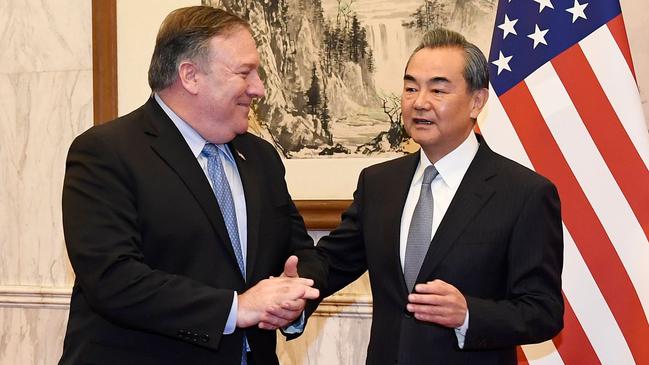China blows up at Pompeo meeting
A rare public confrontation between the top US and Chinese diplomats marked a new level in the worsening relations.

A rare public confrontation between the top US and Chinese diplomats marked a new level in the worsening relations between the world’s two biggest economies and risked complicating an anticipated summit meeting between Donald Trump and North Korean leader Kim Jong-un.
Secretary of State Mike Pompeo exchanged testy words with Foreign Minister Wang Yi in Beijing on Monday at a critical moment for US-China relations, with trade negotiations stalled, military talks halted and both sides blaming each other for a recent close encounter between their warships in the South China Sea.
The exchange followed a speech last week in which Vice-President Mike Pence outlined a shift in US strategy from engagement to confrontation with China, accusing Beijing of undermining US interests on several fronts, including meddling in elections.
It also came as the US presses China — North Korea’s main ally, investor and trade partner — to persuade Kim to abandon his nuclear weapons program.
Mr Wang began his meeting with Mr Pompeo by accusing the US of escalating trade friction, causing trouble over Taiwan and unjustifiably criticising China’s domestic and external policies.
“We demand that the US side stop this kind of mistaken action,” he said.
Mr Pompeo said the US had a “fundamental disagreement” with Beijing on an array of economic and security issues but the relationship between the two countries was “incredibly important”.
Mr Pompeo also did not meet with Chinese President Xi Jinping, as he did in June during his first official visit as secretary of state.
It was highly unusual for a visiting US secretary of state not to meet with the Chinese president and to be publicly chastised by his host, said Daniel Russel, who served as the top State Department official on Asia during the Obama administration.
“The confrontational approach that the Trump administration has taken is far more likely to cause China to dig in than to give in,” said Mr Russel, who is now vice-president of the Asia Society Policy Institute. “It will reduce the likelihood that the Chinese will make common cause over North Korea policy.”
China and the US have overlapping interests in maintaining peace in northeast Asia and in an agreement that would denuclearise the Korean peninsula, but there have also been differences between the two sides about how to go about it. China has long favoured a more drawn-out and phased approach towards denuclearisation than the Trump administration, which has argued in favour of a speedy denuclearisation that might even be accomplished by January 2021, which would mark the end of Mr Trump’s current term. Even before the tough exchange of words, the US was complaining that the Chinese were not enforcing UN sanctions against Pyongyang with sufficient rigour.
Monday’s frosty talks in Beijing came after South Korean President Moon Jae-in said earlier in the day that he expected Kim to soon meet the Chinese and Russian leaders, as Pyongyang courts support from its allies.
During the meeting, Mr Wang said Beijing and Washington needed a healthy and stable bilateral relationship to discuss sensitive matters such as North Korea. His comments appeared to suggest that the US shouldn’t take Beijing’s co-operation for granted.
Mr Pompeo said he wanted to share details of his weekend visit to Pyongyang and to make sure that Beijing and Washington were working together to denuclearise the Korean peninsula. He added, however, that he regretted that China chose not to hold the diplomatic and security dialogue— an annual meeting between Chinese and US diplomats and military officials that had been due to take place this month. As reporters were ushered out of the room, Mr Wang said it wasn’t China’s decision to cancel the dialogue.
In another sign of friction between the two sides, Mr Pompeo didn’t hold a joint news conference with Mr Wang. A senior State Department official said Mr Wang’s remarks didn’t come as a surprise, and North Korea was a “big part of the conversation”.
Asked whether the US was still expecting Chinese co-operation in enforcing sanctions on North Korea, the official said: “Sanctions remain an important part of the overall campaign to bring North Korea to the negotiating table.”
Mr Pompeo said in Seoul earlier that Kim was ready to allow international inspectors into the North’s nuclear and missile testing sites, one of the sticking points over its denuclearisation pledge.
Mr Pompeo, who met Kim during a short trip to Pyongyang on Sunday, said the inspectors would visit a missile engine test facility and the Punggye-ri nuclear testing site as soon as the two sides agreed on logistics.
The Wall Street Journal


